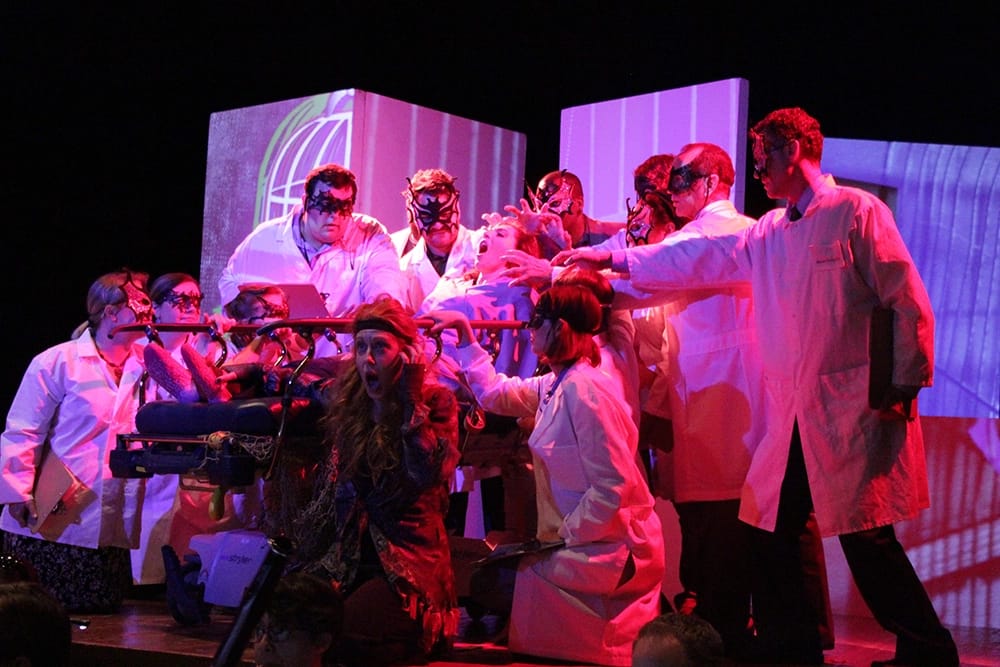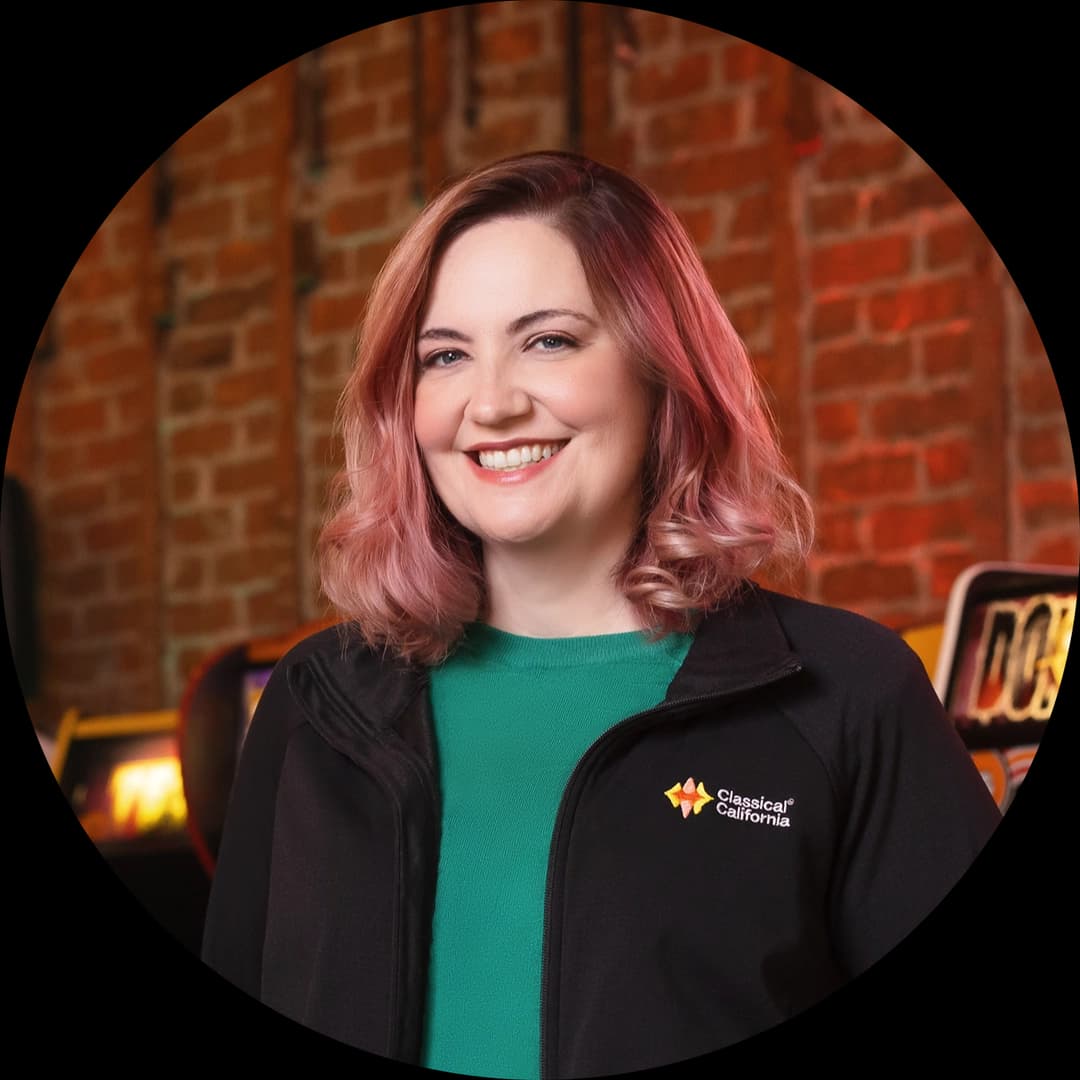
articles / Guide to Opera
Resilience and Recovery through Opera: The Musical World of Kenneth Wells
 A scene from “The Center Cannot Hold” | All photos by Joseph Mango/UCLA
A scene from “The Center Cannot Hold” | All photos by Joseph Mango/UCLA
The worlds of clinical psychiatry and classical music wouldn’t seem like natural partners. And yet they have come together in the career of Dr. Kenneth Wells. Wells is a professor at UCLA with specialties in psychiatry and behavioral science. For the last nine years, he has held another title: opera composer. On January 26, the Psychiatry Education and Research Foundation (PER) will be presenting the PER Advocate Award to Dr. Wells and celebrate his contributions to mental health awareness through the universal language of music.
Largely self-taught in his early years, Wells was part of a musical family and vowed at the age of 12 to write an opera. He always had a love for the form, having amassed a large collection of recordings. He started composing smaller works, vocal pieces and religious works that he performed with his family at churches in and around Southern California. He continued his undergraduate music studies at Occidental College but then went to Bay Area to pursue his medical studies full-time.
When high school friend and fellow opera enthusiast Rick Roudebush was diagnosed with cancer (from which he later recovered), a renewed enthusiasm for completing an opera came to the forefront of Wells’ life. He said to Rick “if you can beat cancer, I can finish an opera.” Over the course of 20 years, Wells would work on his first opera scene by scene. Premiering in 2010, The First Lady told the story of Eleanor Roosevelt’s journey after her husband’s death. Wells saw a lack of operas that portrayed women in a positive light and wanted to explore Eleanor’s story, especially considering the struggle she endured when learning of her husband’s secret affair with her former secretary. “Resilience” was her watchword and Wells saw his opera as a means to express that to an audience.
 Dr. Kenneth Wells
Dr. Kenneth Wells
During the production of The First Lady, Wells invited Dr. Elyn Saks to speak prior to one of the performances. As the author of the 2007 bestselling memoir The Center Cannot Hold, Saks chronicled her diagnosis of schizophrenia while a law student at Yale. As they were driving home that night, Saks suggested that she and Wells collaborate. When he clarified whether it would be an opera or a research project, she said “both!”
The Center Cannot Hold premiered at UCLA in 2016 in conjunction with Pacific Opera Project and the UCLA Semel Institute. It was critically acclaimed for its unflinching musical portrayal of schizophrenia. Wells gave himself the challenge to expand his compositional pallet to musically express the sense of what it’s like to be in a psychotic episode while also maintaining a sense of empathy. He wove in musical ideas from Elyn’s memoir, including her use of the opening theme from Beethoven’s Fifth Symphony as touchstone during one long night being held in restraints while she was in treatment. Elyn is sung by three different women, a soprano portraying present day Elyn (known in the score as Saks), another portraying Elyn as a young woman just learning of her illness, and a third playing Elyn’s conflicted inner monologue known as The Lady of the Charts. Subtitled “The Illness,” the opera ends only part way through Elyn’s story.
Part Two of The Center Cannot Hold is now in the works. Subtitled “Recovery,” it will musically reflect exactly that, contrary to the dissonance of “The Illness.” It will mostly focus on one aspect of Elyn’s life, meeting her husband Will Vinet when she was a new assistant professor at USC and he was a librarian. Wells said, “[Elyn] went into the library and dropped a book and her hands touched that of the librarian . . . both reaching for the book at the same time.” One of the main musical centerpieces is a quintet between the three aspects of Elyn’s personality from the previous production, her friend Steve, and her soon to be husband Will “each in their own space commenting on the power of one moment of love.”
 The cast of “The Center Cannot Hold”
The cast of “The Center Cannot Hold”
Wells wants the audience to not only be moved musically, but to understand the importance of psychological well-being, mental health in the world, and the importance of the factors that enhance that. He wants us to recognize the public stigma surrounding mental health issues and understand that seeking treatment should just be as normal as getting help for any other medical condition. I can personally attest to Ken’s mission being fulfilled. Being part of the production of 2016’s The Center Cannot Hold: The Illness helped me to rationalize schizophrenia using a language I could understand – which was music!
To attend the free PER Foundation event on January 26 honoring Dr. Wells which will include a concert featuring scenes from part two of The Center Cannot Hold, you can RSVP. Mental Health America has been streaming the entirety of The Center Cannot Hold: The Illness for free at mentalhealthamerica.net/opera. And to hear selections from both of Dr. Wells’ operas, you can visit hss.semel.ucla.edu.






